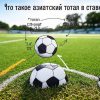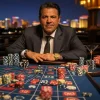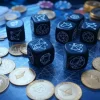Poker is not just a simple card game; it’s an art. Success requires strategy, knowledge, and luck. To become a successful poker player, knowing the poker theory, its rules and basic strategies is not enough. You need to understand your opponents’ psychology, be skilled in probability math, and assess your chances accurately. Books can help with this. They are an invaluable resource of knowledge from the masters of the game.
List of the best poker book
Some books are regarded as the best for learning poker. They cover various aspects of the game: from basic theory to in-depth analysis of psychology and mathematics. These books will be useful both for beginners and experienced players. With them, you can easily grasp the fundamentals and improve your skills.
Top picks:
- “The Theory of Poker” – David Sklansky.
- “Your Worst Poker Enemy” – Alan Schoonmaker.
- “Super System” – Doyle Brunson.
- “The Mental Game of Poker” – Jared Tendler.
- “Treat Your Poker Like a Business” – Dusty Schmidt.
- “Poker Math Made Easy” – Roy Rounder.
- “The Poker Mindset” – Ian Taylor and Matthew Hilger.
- “Applications of No-Limit Hold’em” – Matthew Janda.
- “Optimizing Ace King” – James Sweeney and Adam Jones.
- “The Grinder’s Manual” – Peter Clarke.
- “Preflop Bible” – MMAsherdog.
- “Crushing the Microstakes” – Nathan Williams.
- “Poker Therapy” – Peter Clarke.
- “Moorman’s Book of Poker” – Chris Mournan and Byron Jacobs.
Let’s take a closer look at each poker book and why they deserve your attention.
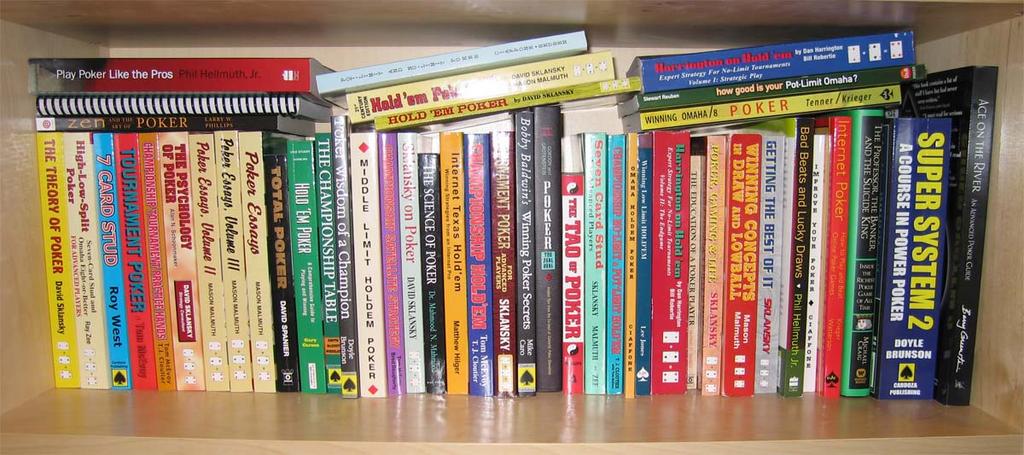
“The Theory of Poker” – David Sklansky
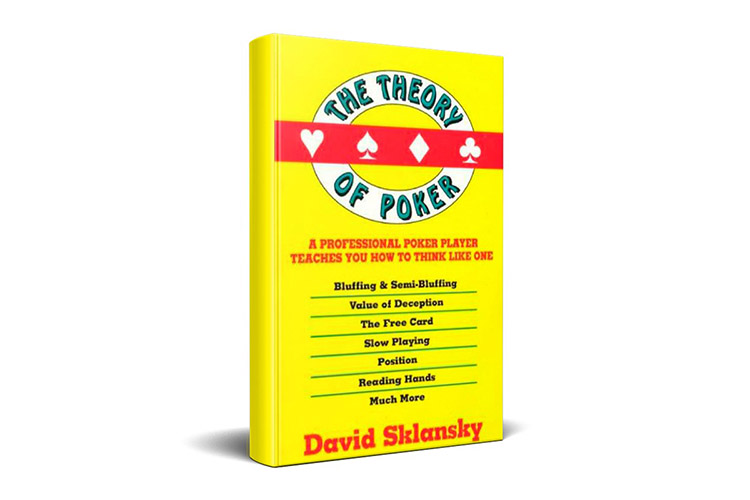
“The Theory of Poker” is a fundamental guide that has become a true classic in poker literature. Its author, David Sklansky, is considered one of the most respected poker theorists. He explains key principles and concepts that can be applied to any form of poker.
This book about poker is particularly useful for those with basic knowledge of the game. It will help them dive deeper into theory. The author explores:
- implicit odds;
- bluffing;
- semi-bluffing;
- table positions, and much more.
“The Theory of Poker” will guide you through which decisions are crucial since every action, in the long run, can lead to either success or failure.
The book emphasizes a strategic approach to poker. It explains how to minimize losses and maximize winnings. Sklansky provides useful instructions and tips for those looking to improve their strategies, encouraging decisions based on math and logic rather than intuition.
“Your Worst Poker Enemy” – Alan Schoonmaker
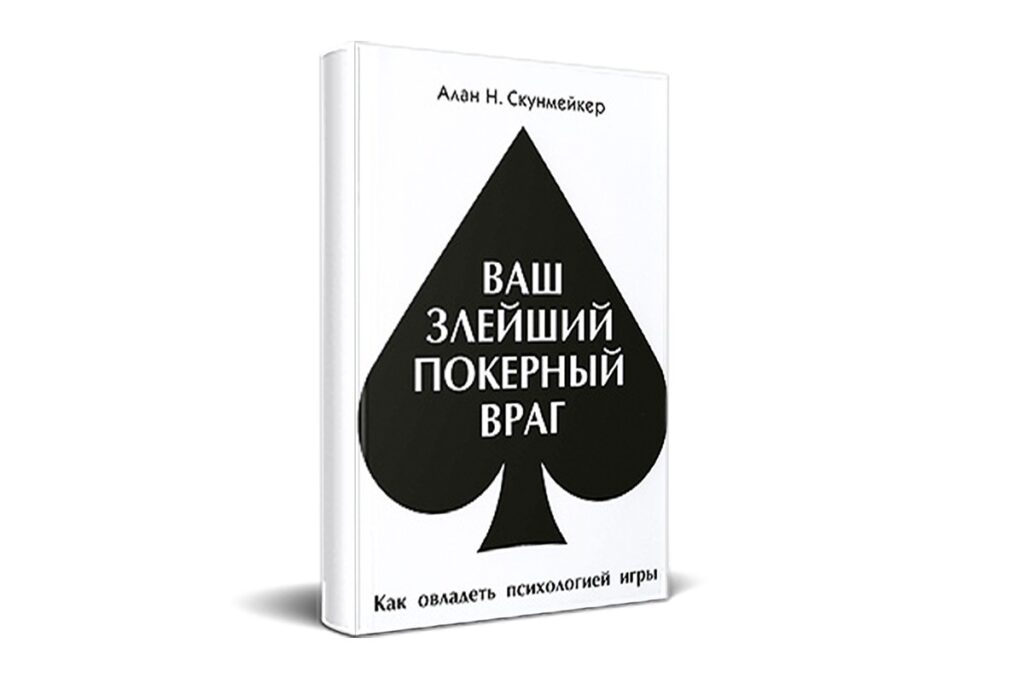
In his book “Your Worst Poker Enemy”, Alan Schoonmaker delves into the psychology of a poker player. It’s one of the most important aspects of the game. The book details the inner world of gamblers, highlighting the personal weaknesses that often negatively impact their results. Schoonmaker emphasizes that poker players’ main enemy is not their competitors but themselves, particularly their emotions.
This poker book is useful for both beginners and professionals. It helps readers understand how psychology affects their game. It makes it easier to identify and overcome psychological barriers that cause issues. As a result, players will be able to make more rational and well-founded decisions.
The book will appeal to those who wants to develop discipline, self-control, and resilience under pressure. Schoonmaker explains how to identify personal weaknesses and turn them into strengths. He covers topics such as managing emotions and bankrolls, the psychology of bluffing, and handling tilt. The book is a valuable guide for avoiding common emotional mistakes, especially during high-stress situations or after a losing streak.
“Super System” – Doyle Brunson
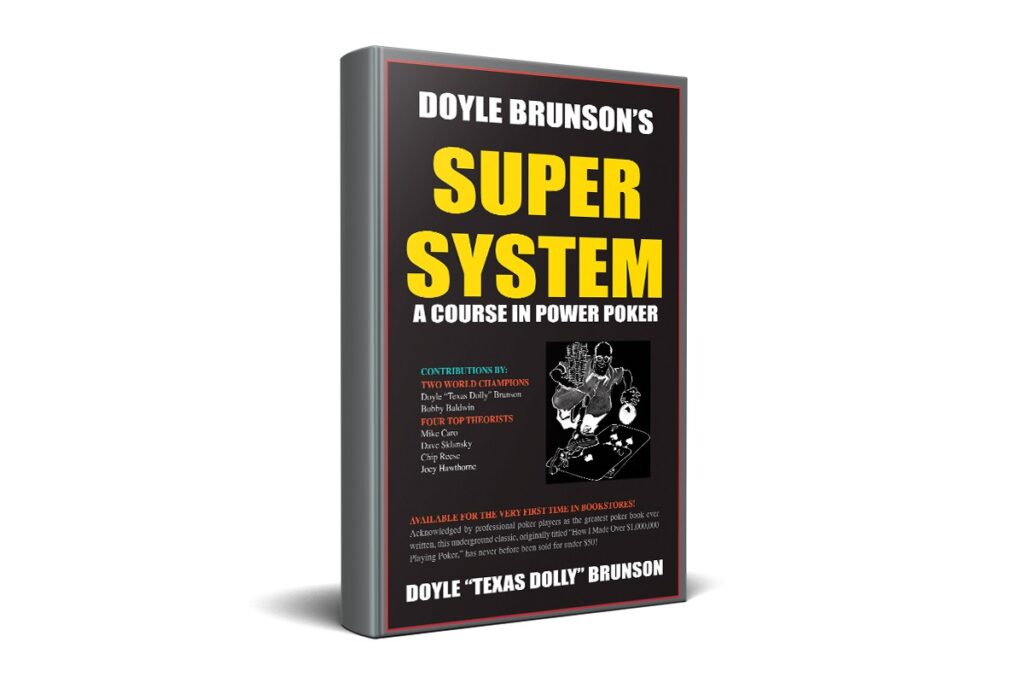
Doyle Brunson’s “Super System” is considered one of the most influential books in the poker world. For many professionals, it is the “Bible” of poker strategy. Its author, Doyle Brunson, is a legend of the game. The book covers a wide range of topics and strategies aimed at achieving success in poker. It shares Brunson’s personal experience and unique insights. This book is interesting for players of all levels and delves into key aspects of the game such as:
- table selection;
- bankroll management;
- strategies for different types of poker;
- game tips for achieving success.
In essence, “Super System” is a universal guide. It applies to all versions of the game. It’s a go-to book for anyone looking to deepen their knowledge of poker’s many aspects.
“The Mental Game of Poker” – Jared Tendle
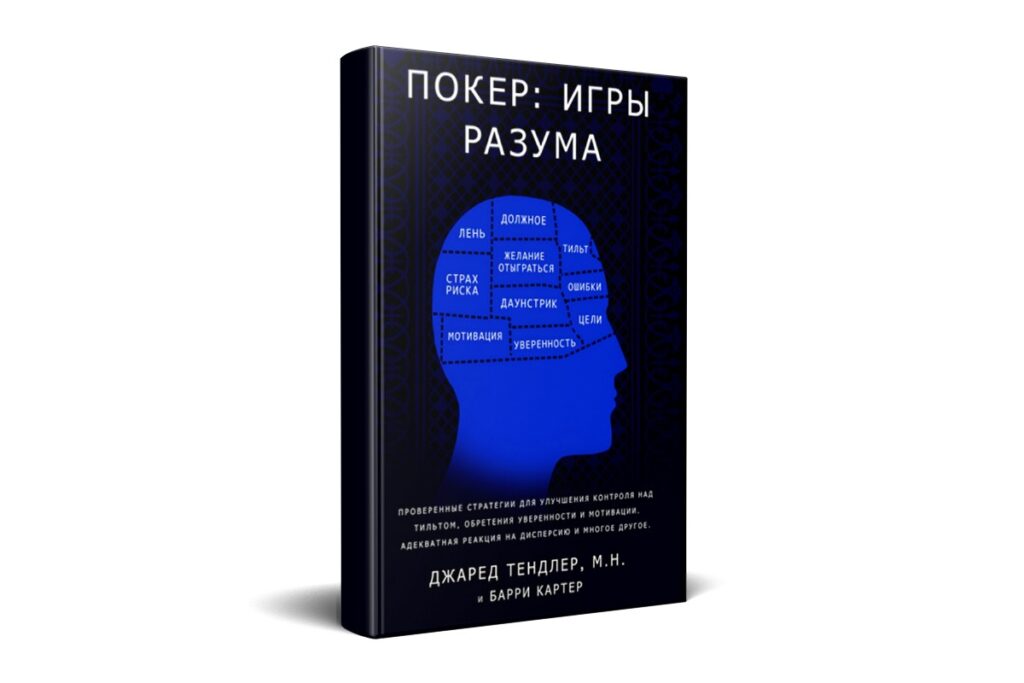
“The Mental Game of Poker” focuses on the psychological aspects of poker. Author Jared Tendler explains how players’ mental state can influence their results. This book helps players learn to manage their thoughts and emotions to play poker at the highest level. The author is a professional coach and psychologist. Tendler reveals his own methods for achieving and maintaining mental toughness.
“The Mental Game of Poker” is suited for players of all levels, especially those who want to build confidence at the table and improve their mental state. It is particularly valuable for those who struggle with issues like overconfidence, tilt, or stress during games. The book offers a variety of tips, strategies, and exercises, including visualization, goal setting, and managing stressful situations and emotions. These techniques are not only useful in poker but also in everyday life.
“Treat Your Poker Like a Business” – Dusty Schmidt
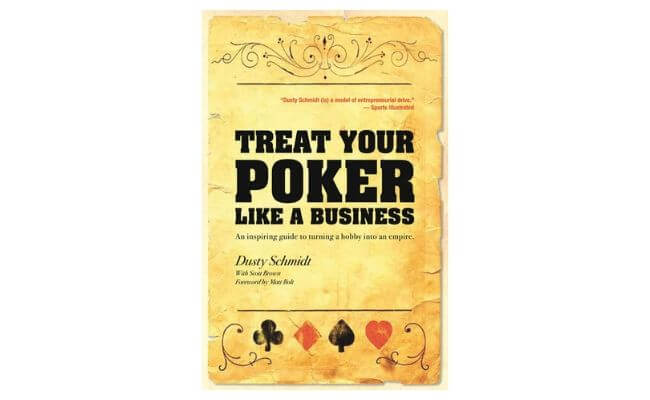
The author of “Treat Your Poker Like a Business”, Dusty Schmidt, is a professional poker player with extensive experience. In this book, he encourages readers to view poker not as a form of gambling but as a serious business venture. Seeing poker as a business can significantly increase profits and minimize risks. These are key aspects for anyone looking to make a living from the game.
This book will appeal to those who plan to take their game to a professional level. Through a business lens, Schmidt provides various tips on bankroll management, long-term goal setting, risk assessment, and more. The author shares his personal methods that have helped him achieve consistent results. He also explains how these principles can be applied not only to poker but also to real life. Special emphasis is placed on strategies as tools for achieving goals and plans. After reading this book, you’ll understand how to make poker a long-term source of income.
“Poker Math Made Easy” – Roy Rounder
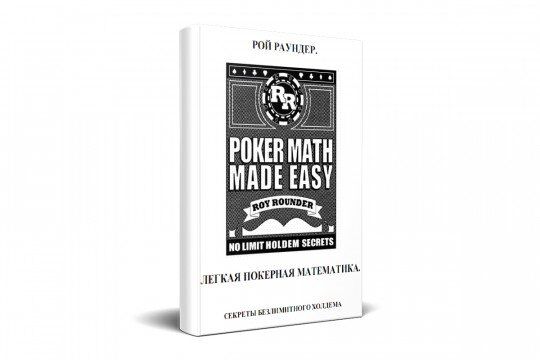
“Poker Math Made Easy” is a book that covers the mathematical calculations used in poker. The author, Roy Rounder, has made an effort to present the material in a way that is accessible to players of all levels. He debunks the myth that you have to be a math genius to succeed in poker. Rounder shows that anyone can grasp the basic concepts and apply them in practice. The author states that he wrote the book specifically to help players improve their game.
The author focuses on detailed explanations of the following mathematical concepts:
- bank’s odds;
- implied odds;
- various probabilities.
Roy also demonstrates how to use these concepts to make more informed decisions at the table. This book is especially useful for those who want to improve their skills and better understand the game without delving into complex formulas.
“The Poker Mindset” – Ian Taylor and Matthew Hilger
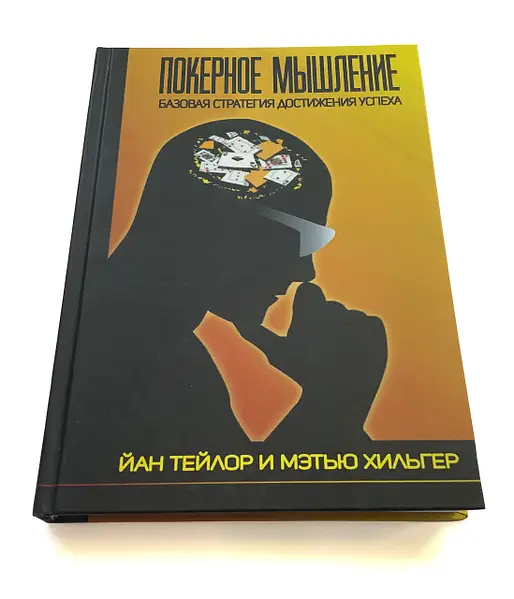
“The Poker Mindset” focuses on the psychological and strategic aspects of poker. Written by Ian Taylor and Matthew Hilger, the book views poker as a game of decision-making. They offer methods to help players think several steps ahead, predicting their opponents’ actions and adjusting their strategies accordingly.
The book is suitable for a wide range of readers, especially those who want to develop an analytical approach and strategic thinking. The main idea is to show how important it is to correctly interpret opponents’ behavior and adapt quickly. The authors present a step-by-step approach to developing a poker mindset, starting with basic concepts and moving on to more advanced strategic decisions. They explain how to use the information gathered at the table to make optimal decisions, taking into account various factors such as position, betting structure, and game dynamics.
“Applications of No-Limit Hold ’em: a Guide to Understanding Theoretically Sound Poker” – Matthew Janda
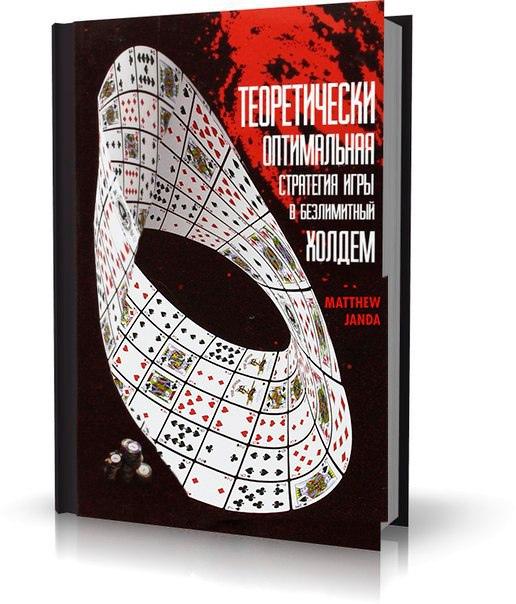
Matthew Janda’s book “Applications of No-Limit Hold ‘Em” has gained significant popularity. The concept of GTO (Game Theory Optimal) becomes increasingly sought after. In this book, Janda explains what GTO is and how players can apply it to increase their chances of success. He elaborates on how game theory optimal play helps minimize losses and maximize wins, regardless of the opponent’s style. Essentially, it’s a deep dive into GTO analysis and its proper application.
This book is most suitable for experienced players who already understand how to make mathematically sound decisions and are looking to enhance and quickly adapt their game. After reading, you’ll be able to take these skills to a new level. Janda provides not just the theory but also practical applications of GTO in various poker situations, such as pre-flop, post-flop, and late-stage tournament play.
“Optimizing Ace King” – James Sweeney and Adam Jones
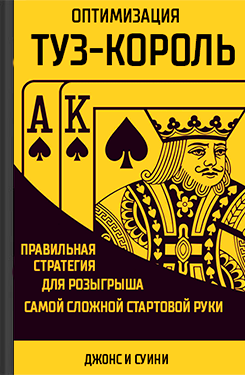
“Optimizing Ace King” is a unique book, as it focuses entirely on the detailed explanation and analysis of one of the strongest starting hands in poker: Ace-King (AK). Authors James Sweeney and Adam Jones explain how to effectively play this combination and maximize its potential.
The book is designed to be engaging for both beginners and professionals. It covers how to play Ace-King at different stages of the game, adapting strategy based on betting structures, opponent actions, and position. The authors discuss various scenarios for playing Ace-King, including pre-flop and post-flop strategies, facing aggressive and passive opponents, and participating in multi-way pots. Additionally, they offer advice on avoiding common mistakes with this powerful hand.
“The Grinder’s Manual” – Peter Clarke
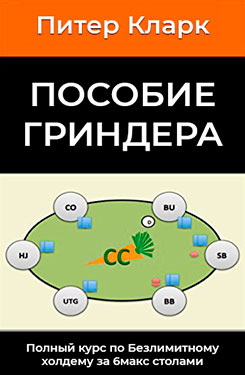
“The Grinder’s Manual” is written for players who want to approach poker not just as a game of chance but as a steady source of income. The book focuses on explaining how to turn many hours of daily play into consistent winnings, ultimately achieving the title of a “grinder.” Peter Clarke shares his practical experience. He pays special attention to the following aspects:
- discipline;
- mental toughness;
- time management.
These skills are essential for long-term success in poker. After reading this book, you’ll have a clearer understanding of how to effectively use your skills and time to generate steady income from poker.
“Preflop Bible” – MMAsherdog

The “Preflop Bible” is an extremely detailed and precise guide focused on preflop play, which is considered one of the most critical stages in poker. The author is a well-known poker player and coach. He analyzes preflop strategies and shares his decision-making experience at this stage of the game.
This book is suitable for both beginners and professionals. It covers how to correctly play starting hands, taking into account position, bet sizing, and opponent types. The author also emphasizes the importance of making well-informed decisions during the preflop phase and how they can set the tone for the rest of the game.
“Crushing the Microstakes” – Nathan Williams

In “Crushing the Microstakes”, author Nathan Williams focuses on playing in micro-limit games, where many beginners start their poker journey. As an experienced player, Williams shares practical tips and secrets for achieving consistent wins. He explains how to build stability in your gameplay and bankroll.
Williams highlights key principles that help players beat their opponents and grow their bankroll. The book covers aspects like starting hand selection, bankroll management, and positional play. Reading this book offers insight into the specific challenges and opportunities of playing micro-limit poker.
“Poker Therapy” – Peter Clarke
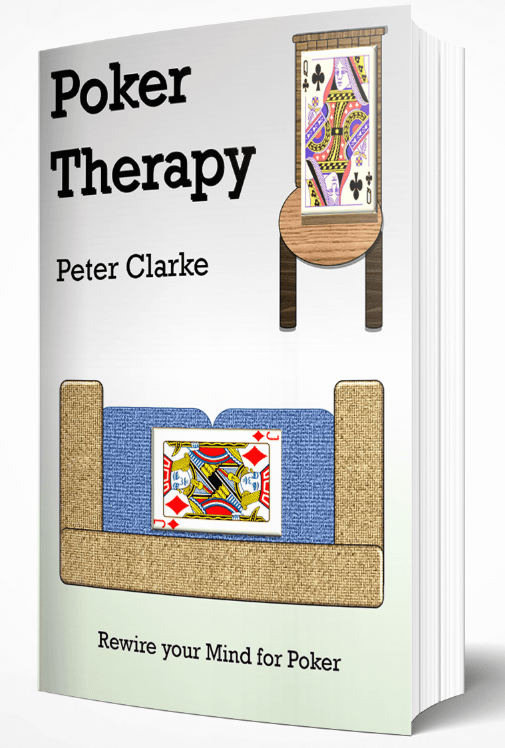
In “Poker Therapy”, Peter Clarke delves into the psychological aspects of poker, arguing that they are often more important than technical skills. The book focuses on critical areas such as:
- dealing with tilt;
- developing emotional resilience;
- managing stress.
This poker book is ideal for players who understand that poker is not just about calculations and blindly applying strategies, but also about emotional control. Clarke describes specific strategies, techniques, and tips for handling the psychological challenges that arise at the table. After reading, you’ll learn how to stay calm in stressful situations to improve your chances of success and avoid costly mistakes.
“Moorman’s Book of Poker” – Chris Mournan and Byron Jacobs

Chris Moorman is regarded as one of the most successful online poker players in history. In “Moorman’s Book of Poker”, he collaborates with Byron Jacobs to analyze his own games and explain how to make the right decisions even in the most complex situations. The book consists of real game examples, accompanied by commentary from a professional.
“Moorman’s Book of Poker” will interest players of all levels who want to gain insights into the thought processes, skills, and recommendations of one of the best players in the world. It provides valuable knowledge for improving your own abilities, advancing to a more professional level, and achieving consistent earnings.
Each of these book poker offers a unique perspective on poker, whether it’s strategy, psychology, or mathematical analysis. They all can help you become a more successful player.
